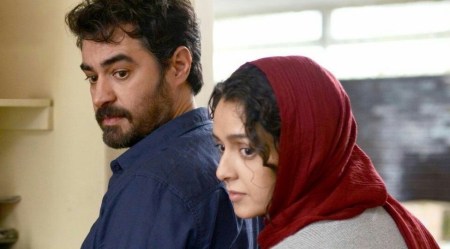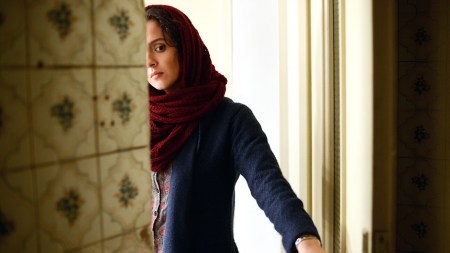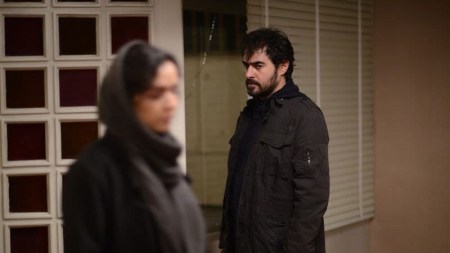The Salesman

Director: Asghar Farhadi.
Screenplay: Asghar Farhadi.
Starring: Shahab Hosseini, Taraneh Alidoosti, Baba Karimi, Farid Sajjadihosseini, Mina Sadaati, Maral Bani Adam, Mehdi Kooshki, Emad Emani, Shirin Aghakashi, Mojtaba Pirzadeh, Sarah Asadollahe, Sam Valipour.
“Degenerate is the one who speaks his mind through swearing”
After About Elly, the second instalment of my Asghar Farhadi trilogy is his latest film The Salesman. Alongside it’s Oscar for Best Foreign Language film of 2016, it was also a nominee for the Palme d’Or at the Cannes film festival with Farhadi winning Best Screenplay and Shahab Hosseini winning Best Actor. So it’s fair to say that this film hasn’t exactly went unrecognised in terms of awards. However, I’ve yet to hear much personal discussion on it from anyone other than the critics and it would seem that Farhadi has still some way to go before he gets the recognition he deserves among your average film enthusiast. 
Plot: Once their flat becomes damaged, Iranian couple Ranaa (Taraneh Alidoosti) and Emad (Shahab Hosseini) are forced to find new accommodation. They rent a place from a friend but they’re unaware that the previous tenant had been a prostitute who had many clients. One night, one of the clients pays a visit to the apartment while Ranaa is alone at home taking a bath and a sudden eruption of violence changes the peaceful lives of the husband and wife.

Once again Farhadi’s meticulous pacing is on full display with this one. He begins slowly and assuredly with some consideration for the film even being likened to the pace of a Michael Haneke picture. As much as I greatly admire Haneke, I find Farhadi much more involving and somewhat of a mix between Haneke’s style and that of Ken Loach or Mike Leigh in their social realism.

With The Salesman, Farhadi attempts to go in a slightly different direction. His narrative structure is essentially the same but on this occasion he juxtaposes it with another storyline that’s played out on stage by our thespian characters. With excerpts from Arthur Miller’s Death of a Salesman our characters are allowed an outlet to their personal troubles by being able to express their emotions and articulate their tension and vulnerability nightly on stage when they are unable to do it with each other at home. This also allows Farhadi the opportunity to neatly tie-in our lead characters struggle with that of Miller’s Willy Loman and his inability to provide for his family. That said, this is still very much Farhadi’s own material but what I did find was that it didn’t have the twist or the final punch in the story that the film seemed to be leading up too. Instead it plays it straight down the line and any suggested ambiguity never quite transpires. That said, this doesn’t prevent Farhadi from structuring another finely tuned drama which is so rich with nuance that it’s hard to avert your gaze. There are very few filmmakers who can tell a story the way that Farhadi can such is his measured pacing and supremely crafted storytelling. For a healthy portion of the film nothing actually happens but it never feels that way. It feels so dense with mood and naturalistic dialogue that Farhadi is never in danger of losing your interest. Much like About Elly, it feels like a window into these people’s lives and what little drama we see in terms of action is expressed loud and clear within the internal struggle of the characters.

Solid filmmaking from Farhadi as he touches on the issues of Iran and the shame brought upon a person by public humiliation that seems to be deeprooted in their cultural mindset. That said, this theme is not as significant to the plot as it is in Farhadi’s other work. This film is more concerned about the nature of revenge and the soul devouring consequences it can have on an otherwise decent individual. –
(To complete my Asghar Farhadi trilogy, I’ll finish with his Oscar winning and critically acclaimed, A Separation.)

Mark Walker
Trivia: A few days after the Oscar nominations were announced and the movie was included among the five nominees as Best Foreign Language Film, Asghar Farhadi made a statement that he would not attend the ceremony due to Donald Trump’s executive order barring Iranians from entering the U.S. When the Oscar was awarded to the film Farhadi had someone read out a prepared statement during the acceptance speech, apologising for his absence and pointing out the inhumane laws and war-mongering behaviour of Trump.
April 11, 2018 at 11:20 pm
What a fine project you’ve given yourself. I am embarrassed that I’ve not seen About Elly or The Salesman. As always, a fine review which makes me want to see it.
LikeLiked by 1 person
April 13, 2018 at 7:43 pm
It’s been a great project Cindy. Asghar Farhadi’s films have eluded me for too long and I can honestly say that his work lives up to its reputation. He’s a fabulous filmmaker who really knows how to tell a story.
LikeLiked by 1 person
April 14, 2018 at 5:03 pm
Interesting tidbit about Farhadi and Haneke. I’ve always noted some of the stylistic similarities between the two (though as you mentioned, Farhadi is a far more humanist filmmaker). In fact, I read an interview by Haneke a few months ago where he said his favorite filmmakers today were Farhadi, Ruben Östlund, and Yorgos Lanthimos.
But while I really like The Salesman, it’s not quite as tight as A Separation or About Elly. Still, even though I was hoping that Toni Erdmann would take the Oscar, I was pleased to see this win.
LikeLiked by 1 person
April 14, 2018 at 5:56 pm
That’s interesting from Haneke. I’m happy to hear that he holds Farhadi in such high regard and coming from him that’s quite the compliment.
I’ve yet to see Toni Erdmann (got a copy but not found the time yet) but I’m happy The Salesman was recognised too – even if it’s slightly hotly the weaker of the trilogy I’ve just watched.
LikeLiked by 1 person